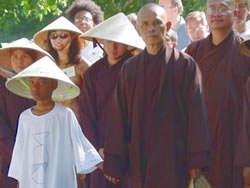An
introduction of
Thich Nhat Hanh
Zen
Master, poet, peace and human rights activist
by Dr. Paul R. Dekar
(This
intro and "Walking with Peace" are also available in audio.)
October
2nd, 2002, mark[ed] the birth of Mahatma Gandhi in 1869. A
century and a half ago, concepts such as mindfulness, non-violence,
and soul force
were scarcely
known outside of Asia.
In
North America they are now commonplace, in part because of
the legacy, the work of Mahatma Gandhi and those who continue
in the path
of non-violence, of soul force, of mindfulness.
In
1967, I joined a movement called the Fellowship of Reconciliation.
It has chapters around the world. It includes a Buddhist peace
fellowship, a Jewish peace fellowship, a Muslim peace fellowship,
Baptist, Methodist, and so forth.
As
a gift and welcoming me into membership, I received postcards
from two members of the
Fellowship of Reconciliation. These postcards read as follows:
A
nation that continues year after year to spend more money
on military defense programs than on programs of social uplift
is approaching spiritual death.
Martin Luther King, Jr.
The
second postcard that I received in 1967, reads as follows:
The
people in the movement can write very good protest letters,
but they are not yet able to write love letters. We need
to learn to write to the Congress and to the President of the
United States letters that they will not put into the trashcan.
We need to write the kind of letter that they will like to
receive -- love letters. The way you speak, the kind of language
you use, the kind of understanding you express, should not
turn people off, because the people you write to are also
persons
like you and me.
Thich Nhat Hanh
Thich
Nhat Hanh is Vietnamese. By his engagement, he is a world citizen.
In Saigon in the early 1960s, he founded the School of Youth
for Social Service, a grass-roots relief organization that
rebuilt bombed villages and set up schools and medical centers,
resettled homeless families and organized agricultural co-ops.
Rallying over ten thousand student volunteers, the school based
its work on Buddhist principles of non-violence and compassionate
action.
Despite
the government's denunciation of this activity, Thich Nhat
Hanh also founded a Buddhist university, a publishing
house, and a peace magazine.
Exiled
from his native Vietnam, he traveled to the United States,
where he made the case
for peace at the highest levels of government and in grassroots
activities such as the one you are a part of this morning.
He
met Dr. King, and their conversations contributed in no
small measure to Dr. King's speaking out against
the war in Vietnam. Dr. King, in 1967, nominated Thich Nhat
Hanh
for the
Nobel Peace Prize. Dr. King stated,
I do not
personally know anybody more worthy of the Nobel Peace
Prize than this
gentle Buddhist monk from Vietnam. I know Thich Nhat
Hanh. I am privileged to call him my friend.
After
the war, the venerable Thich Nhat Hanh and his colleagues on
the Vietnamese Buddhist Peace Delegation in Paris helped war
victims, including the boat people, many of whom came to Memphis,
the Mid-South, and to other cities in this country in the early
'70s.
Uncertain
how next to proceed, Thich Nhat Hanh entered a period of retreat,
and for five years he remained at a hermitage
in France, meditating, writing, gardening, and occasionally
receiving visitors. For the last twenty years, his
vocation has been more public.
He
has lectured and led retreats around
the world, encouraging people to live mindfully and
compassionately. He has written over a hundred books, many
of which are translated
into English with titles such as Living Buddha,
Living Christ and Being Peace.
In
1983, Thich Nhat Hanh helped form the Community of Mindful
Living and the creation of Plum Village and other communities,
both in this country and around the world. We are privileged
this morning that Thich Nhat Hanh has been accompanied to Memphis
by over forty-five members of his communities, from the Green
Mountain Dharma Center in Vermont, Deer Park Monastery in San
Diego, and Plum Village in France.
Today
we walk peacefully, happily. We walk as a walk of compassion.
We can go in many directions. There are voices calling
for war in the world today. Today this gathering mindfully
reflects
on compassion and peace. Our path is a beautiful path.
The miracle is that we are on Earth, walking.
The
author of these words is the venerable Thich Nhat Hanh. Will
you please welcome him to Memphis.
Copyright ©2002
Dr. Paul R. Dekar
Dr.
Paul R. Dekar is Niswonger Professor of Evangelism and Missions
at Memphis Theological Seminary, Memphis, TN
|




